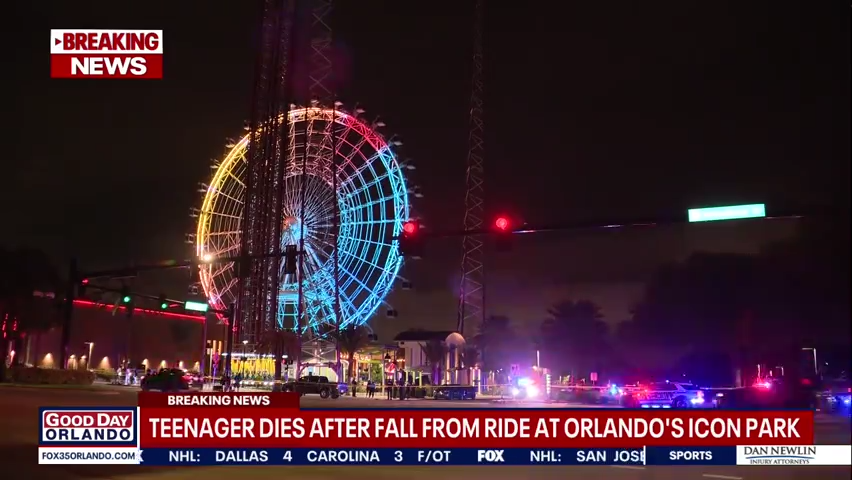Family sues over death of 14-year-old boy who fell from Florida amusement park ride – USA TODAY

- Family attorney Ben Crump said the companies named in the complaint were negligent in multiple ways.
- The sensors on the seat Tyre Sampson fell from was unsafely modified, an investigation found.
- The Orlando FreeFall ride will remain closed indefinitely as the investigation continues.
The family of the 14-year-old boy who died last month after falling from a Florida amusement park ride filed a wrongful death lawsuit Monday, accusing the park, ride operator and manufacturer of negligence.
Tyre Sampson died March 24 when he slipped through the gap between the harness and the seat on the Orlando FreeFall ride at ICON Park, an accident report found last week.
The lawsuit claims the ride was “unreasonably dangerous” and that Tyre died as a direct result of the negligence of ICON Park, which leased the space; the Slingshot Group, which owns and operated the ride; Funtime Handels GmbH, the Austrian company that manufactured the ride; and Keator Construction, which built the ride. Multiple other businesses connected to the ride are named in the suit.
“It could have been preventable at any stage,” attorney Michael Haggard told USA TODAY. “There are multiple failures from the minute this was engineered to 11 p.m. that fateful night.”
The companies failed to warn Tyre of the ride’s height and weight restrictions, failed to properly train their employees, and failed to provide an appropriate restraint system like a secondary seatbelt, according to an advanced copy of the lawsuit provided to USA TODAY by the family’s attorneys.
ACCIDENT REPORT: Florida park ride seat was adjusted before 14-year-old boy fell to his death
The lawsuit was filed Monday around noon in the Circuit Court of Orange County on behalf of Tyre’s parents according to a court records.
“The defendants in Tyre’s case showed negligence in a multitude of ways,” family attorney Ben Crump said in a statement. “From the ride and seat manufacturers and the installer to the owners and operators, the defendants had more than enough chances to enact safeguards, such as seatbelts, that could have prevented Tyre’s death. They didn’t, and their poor decisions resulted in deadly consequences for a promising young man and lifelong pain for his family.”
The FreeFall ride opened in the center of Orlando’s Entertainment District late last year and billed itself as the world’s tallest free-standing drop tower. On the ride, 30 passengers rise to the top, tilt forward and plunge nearly 400 feet at speeds reaching more than 75 mph, according to a January news release from the park.
Although a weight limit was listed in the ride’s operating manual, no height or weight restrictions were posted at the ticket counter and employees were not trained on the restrictions, according to the lawsuit. The ride’s operations and maintenance manual lists the maximum rider weight as approximately 287 pounds.
An accident report released last week found that the sensors on Tyre’s seat were also manually adjusted, which allowed the ride to operate while his seat had a restraint opening almost twice as large as normal even though it was unsafe. The average restraint opening is about 3 inches, but on two modified seats, the gap was about 6 inches and it may have expanded even further during the ride, the report found.
‘SHOCKED AND HEARTBROKEN’: 14-year-old dies in fall from massive drop tower in Florida
The seat was adjusted “presumably to allow for larger riders,” state Rep. Geraldine Thompson said at a news conference, but it’s unclear who adjusted the seats and when.
ICON Park previously said the company was “deeply troubled” by the preliminary findings of the state’s investigation. USA TODAY has reached out to the three companies for comment.
The lawsuit claims the ride was “unreasonably dangerous” and that a reasonable manufacturer would have installed seatbelts or a secondary restraint system, not allowed the proximity sensors to be manipulated, and installed a mechanism to stop the ride if riders weren’t properly secured.
Hannes Lackner, general manager of Funtime Thrill Rides, said in a January letter attached to the user manual that there is “no need for an extra safety belt or seat belt because the seat and restraint system fulfill more than the requirements.”
The companies concealed “the defective design of the Free Fall ride and its known susceptibility to cause injury and death in normal ride operation,” according to the court documents.
The family is seeking damages in excess of $30,000 as well as attorney fees.
The ride will remain closed indefinitely, said Nikki Fried, Florida commissioner of agriculture and consumer services, last week.
Contact Breaking News Reporter N’dea Yancey-Bragg at nyanceybra@gannett.com or follow her on Twitter @NdeaYanceyBragg




